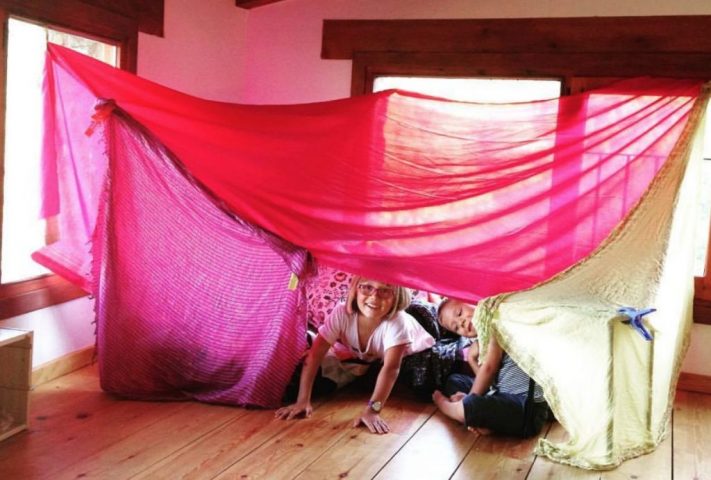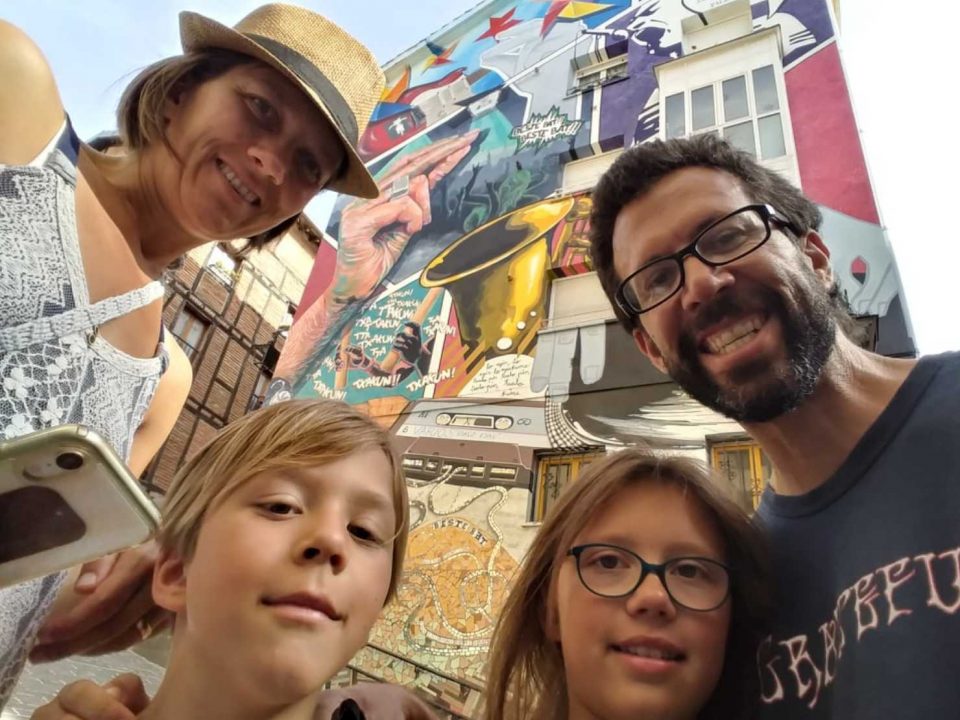
New Education: A year without a principal
January 28, 2019
Digital Nomadism: How to earn money while living and traveling abroad
February 8, 2019The article is the SECOND PART of an ongoing series. Read from the beginning at New Education: A year without a principal.
Previously, I shared the story of how my wife and I sold everything we owned and uprooted our two children (ages 3 and 6) from the California suburbs to live a life of Euro-nomadism. We felt sure that this experience would provide our children with an education far superior to what they would get from a conventional preschool or first grade classroom. And, of course, we found the idea of travel and adventure irresistibly enticing.
A few skeptics warned us that we were giving up an enviable life in California and a thriving business, in exchange for a future of utter uncertainty. But we were convinced that the journey would be worth it, even if we had no destination in mind. Moreover, as a digital freelancer and a seasoned entrepreneur, we felt confident that we would land on our feet wherever we ended up.
The Road to Nowhere
After a year of moving from one farm or household to another, month after month, mowing lawns, organizing compost and revamping websites in exchange for room and board, we still had no idea where we were going. From the beginning I’d been telling my family that we were heading for Portugal. But since our first stop in central Germany, we never actually got within 1000 km of the Portuguese frontier.
And as we drifted between the peaks of the Pyrenees and the slopes of the Rhine valley, with no direction home, our daughter — now seven — was making it very clear that she had grown tired of drifting and was ready to settle. We’d been on the road for a while now, and so we understood. We were all beginning to see the value of a kitchen and a bathroom we could call our own, not to mention the need for proper heating and reliable wifi.
Our daughter’s wish to be grounded and settled was perfectly natural. We had no desire to ignore this longing for domesticity. Our kids were at the age when they needed to make friends more than they needed to make another trip to a 12th century monastery in the French countryside. And we understood perfectly well that providing them a happy childhood was, and is, an infinitely higher priority than trying to satisfy our own insatiable appetites for adventure. But at the same time, it was forcing us into a decision that we weren’t quite ready to make.
All Things Considered
With all that in mind, we had to stop and take serious stock of our situation. For the past 12 months we’d just moved about and took our chances. For the most part, we’d gotten pretty lucky with our hosts. We’d ended up with a warm, inviting family nearly every time. But the time for trying our luck was behind us. If we were to settle down, put our kids in school and sign a long term lease on house or apartment, we’d have to get it right the first time.
The thought of it already had us flittering with trepidation. Wasn’t the whole point of this adventure about finding an alternative method of educating our kids without sending them to school? That was part of it anyways. And we’d found some incredible ways to do just that. But if we wanted to stay in Europe — which we did — then we’d have to accept the fact that homeschooling is illegal in almost every country.
Families have the right to homeschool in the U.K., and also in France under very strict regulations. But we had no intention of moving to the U.K., and the thought of being strictly regulated by French bureaucrats was enough to make our rugged individualism run like melting Emmental.
So we continued to weigh our options and assess our priorities. Coming from California’s central coast and having spent the last year working in pastoral settings, we knew we weren’t going to move to a big city. We needed proximity to nature and some quality landscape. But we also wanted to make the most of living in Europe, which meant having access to culture. We wanted to be close enough to a decent sized city, preferably one with an international airport. And we really liked the idea of living close to an international border.
As it happened, more than half of our WorkAway hosts were situated very close to a border. The ease with which you can hop over the border, from Germany to Holland or France, or from Austria to Slovenia, or from Spain to France, we always found very appealing. And it’s part of what makes Europe Europe.
Gradually we narrowed our options down to the Black Forest region of southwest Germany, and the high valley of Cerdanya in the Spanish Pyrenees. The Black Forest area sits between Stuttgart and Freiburg, two very stimulating cities, and closely borders both France and Switzerland. Meanwhile, the Cerdanya valley straddles the border of France and Spain, and is for all practical purposes a trilingual zone, with French, Spanish and Catalan. Just two hours north of Barcelona, the region is something of a mountain paradise in the Pyrenees.
But this still left us wondering where, whether and how we would enroll our kids in school. A year earlier we had presented our daughter with the possibility of attending school in Germany. We even visited a grade school, where local officials insisted that she enroll, in accordance with Germany’s mandatory schooling law. The experience left our daughter somewhat traumatized by the big classrooms, the throngs of strangers and the German disciplinarian ambiance. But as we ended up not registering as German residents, she was not required to attend.
Free Range Pupils
This was just one more factor pushing us to seek an alternative approach. And as we travelled, we met more and more families who were considering or wholeheartedly embracing an alternative system for their own children. Slowly I came into contact with more books and people who were promoting the idea of unschooling. And what I quickly observed was that no other group seemed to be endorsing the unschooling model more enthusiastically than that of former teachers. More than anyone else, it was those who had actually spent time working in the public school system who had become the most critical and disillusioned of all.
When I was still living in California and working full time, it was easy enough to imagine sending my kids to a regular school where somebody would look after them at no charge, and provide them with an adequate education at the same time. But after a year of being around them all the time, watching them grow and learn and discover things for themselves, it became hard to picture sending my kids to an ordinary school with a standard curriculum. And the more time I had to think about it, the more problematic it became.
The current system of education is still dragging its gangly feet out of the 19th century, where it was set up as of way of getting youngsters out of the coal mines and training them to be busy little clerks for the burgeoning British Empire. Slowly the system evolved, but if you compare the kind of grade school education I got in the 1980s to the way my parents were educated in the 1950s, to how classrooms are structured today, you’ll find more similarities than differences. In fact, I challenge you to find to a single aspect of society that has changed as little in the last 50 years as the public school classroom. How can this relic of the past possibly be preparing our children for the future?
Earlier I mentioned a host family in Austria, just minutes from the Slovenian border, where we’d spent a month working, learning and unschooling. The law in Austria is actually pretty similar to France. You can homeschool, but they conduct annual tests. And if the child doesn’t perform well enough on the test, s/he will have to attend school the following year. In other words, you are still required to follow a standardized curriculum, and everyone is expected to cover the same material at basically the same time.
Now I completely understand that as a society, you want people to be fully literate and educated, and you don’t want children being brainwashed by political fanatics and religious fundamentalists. I get that. But surely there must be a way to prevent that while still allowing families and students the freedom to pursue their own interests and discover their true passions. In a free learning environment, a child may become fascinated with something like chess or animal husbandry. And who knows where that could lead? But if your chief aim is to pass the standardized test, you’ll never find out.
And that’s a bit like what happened with our friends in Austria. They live on a beautiful piece of property in Styrian wine country, where they raise animals and grow food, and dad keeps pretty busy restoring and maintaining a couple of structures as rental properties. Their older son, who was 11 at the time, had taken an interest in sheep. He was also raising chickens and selling their eggs to pay for straw and other fencing materials for his two sheep.
With the help of his parents and motivated by his own keen interest, the boy learned all about animal care, arithmetic, bookkeeping, electrical fencing, and who knows what else. But sadly, when the inspector came around, he did not perform well on the test. Still, the parents refused to send him to school. He wanted to continue with his projects at home, where anyone could plainly see that he was receiving a fantastic, hands-on education. After a prolonged legal battle, the local officials finally made an exception and allowed this family to continue learning at home without being tested. In the absence of any structure or curriculum, they shy away from the term unschooling, and prefer to call themselves “Free Learners”.
The stories and lessons from this family could easily fill a book, and the month we spent with them certainly opened our eyes to new ways of learning and teaching. But ultimately, I think we weren’t quite ready to embrace the role of Free Learner parents. For example, I don’t think we can overcome the need to put a limit on our children’s daily screen time. The Free Learner policy, on the other hand, says to trust the child, and they will eventually learn to set their own boundaries. They might go crazy on video games for a few weeks, or a few months, but at some point they will tire of it and discover a new interest.
The Push Back
Even so, they are many aspects of the Free Learner philosophy that we fully accept and support. At one point, we had considered moving back to Austria and renting one of their units to live with them as a small community. It might have been an amazing experience, but somehow it didn’t work out. And so we were left to debate between the Black Forest and the Spanish Pyrenees. And to further complicate the decision, there was always the unspoken option of undercover homeschooling.
In Germany it’s risky. Yes, the police will come to your home looking for your children, and maybe even take them away. But it’s not altogether unheard of, and some manage to get away with it. In Spain, however, it’s not something people worry about so much. If a family wants to do something their own way, the Spanish tend to look the other way and respect the autonomy of the family.
The problem is, if you’re homeschooling or free learning in a place where it’s illegal and/or very rare, then it becomes very difficult to have a well-rounded, positive learning experience for the children. The beauty of alternative schooling, as we experienced it in California, was in getting together regularly with other families, sharing knowledge, skills and resources, to ensure a stimulating environment for the kids. Without that social dynamic, it can be very difficult for both the children and the parents, who are also expected to play the roles of students and teachers. Without the external stimuli and social interactions, it’s only a matter of time before the heads begin to butt.
Perhaps that’s the reason our kids finally spoke up and told us they wanted to go to school. This came as something of blow to my wife, who was especially determined to find a way out of consigning our children to a classroom. But it was clear that what they really craved was to be around other children. And when you live in a place where children are required to go to school, then that is generally where the children will prefer to be.
Furthermore, as a foreigner, I could see the definite advantage of putting our kids in school. Wherever we moved, one of our top priorities would be to find a place where our kids could make friends, pick up the language, and integrate as quickly as possible with the local population. And the obvious place to do that would be in a school.
Still, we wanted to find one that offered the sort of learning environment we would approve of, and with our strict—you might even say eclectic—criteria, we knew that wasn’t going to be easy.
TO BE CONTINUED . . . see PART III: Paradise Found.
For more informative and entertaining stories about our unconventional schooling experiences, be sure to check out our articles on Location Independent Schooling, Old World Learning, More On Homeschooling, Freeschool and Roadschool. You might also enjoy this story about Cultural Integration.





